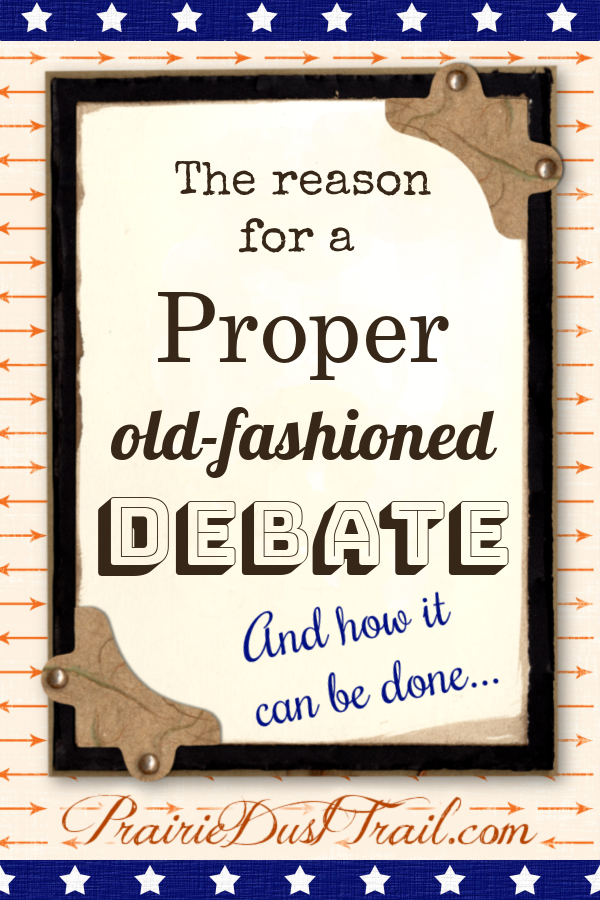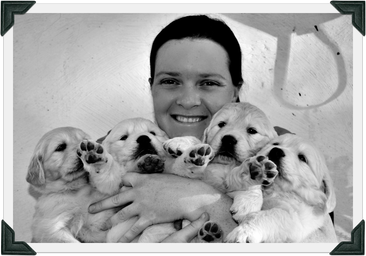|
I love a good debate. I’m passionate about my beliefs, always have been, even as a child. I’m also a peacemaker. So often, the root of my passion in a debate is to help people understand each other and find common ground.
“Finally, be ye all of one mind, having compassion one of another, love as brethren, be pitiful, be courteous: Not rendering evil for evil, or railing for railing: but contrariwise blessing; knowing that ye are thereunto called, that ye should inherit a blessing. For he that will love life, and see good days, let him refrain his tongue from evil, and his lips that they speak no guile: Let him eschew evil, and do good; let him seek peace, and ensue it. For the eyes of the Lord are over the righteous, and his ears are open unto their prayers: but the face of the Lord is against them that do evil.” 1 Peter 3:8-12 |
A debate (noun) does not have to be an argument. It can be, and in the since I’m touching on here is dialog, commentary, discussion, or powwow.
Debates are a historical way of educating and informing people. It’s more fun than a lecture by just one person. Listeners get the benefit of multiple perspectives. Good debates tend to encourage people to think for themselves, rather than telling the listeners what to think.
A debate is over a topic that is of mutual concern to the speakers. Their ideas concerning the topic or solutions to a problem differ because of the speakers’ backgrounds, education and perspectives. If speakers can remember they are both concerned about those whom the topic touches, they can more easily stay civil and professional.
Debates are a historical way of educating and informing people. It’s more fun than a lecture by just one person. Listeners get the benefit of multiple perspectives. Good debates tend to encourage people to think for themselves, rather than telling the listeners what to think.
A debate is over a topic that is of mutual concern to the speakers. Their ideas concerning the topic or solutions to a problem differ because of the speakers’ backgrounds, education and perspectives. If speakers can remember they are both concerned about those whom the topic touches, they can more easily stay civil and professional.
It has become harder and harder to have a productive debate. Public debates are often more about the speaker than the subject matter anymore. Sides take turns verbally throwing mud back and forth, rather than legitimately trying to inform and educate their listeners.
Preparation for a debate should be more about the audience than the speaker. Too often, speakers have a prepared propagandized topic they are paid to push rather than actual education or productive information. This is actually true with many public speakers anymore.
I actually heard one speaker bully his audience, making fun of anyone who dared think differently than the propaganda he was pushing. He was so good at it he insulted the audience and they were excited about his false narrative. This particular speaker is so good at what he does, he is paid by different agencies and organizations around Oklahoma to spread whatever propaganda they’re pushing. I get literally sick to my stomach every time I hear him speak, no matter the topic.
I’m convinced a debate can be an enjoyable experience for both the audience and the speakers. Some basic guidelines would need to be set first.
Speakers should keep in mind:
How it should be conducted:
Bible verses to keep in mind:
It’s important to remember, when debating someone who is not a Bible believer that we are not to hold them to the same standards we are held to. We are to treat the lost with compassion, mercy and tender care. While we do not approve, entertain or excuse evil, we also need to see the hurt and manipulation that the enemy uses to ensnare and lead individuals astray.
There are times to debate and there are times to keep quiet. (Ecclesiastes 3:7) Discernment is important. I’ll admit that I am still learning discretion. Some people are not open to other ideas. (Proverbs 14:7, Psalm 1:1)
In this day and age, with the severe split in society worldwide, honest and open debate can be a useful tool in finding innovative solutions to real dilemmas. If you are a non-confrontational person, consider it encouraging and motivating thought. If you are confrontational by nature, pray for discernment and discretion.
Preparation for a debate should be more about the audience than the speaker. Too often, speakers have a prepared propagandized topic they are paid to push rather than actual education or productive information. This is actually true with many public speakers anymore.
I actually heard one speaker bully his audience, making fun of anyone who dared think differently than the propaganda he was pushing. He was so good at it he insulted the audience and they were excited about his false narrative. This particular speaker is so good at what he does, he is paid by different agencies and organizations around Oklahoma to spread whatever propaganda they’re pushing. I get literally sick to my stomach every time I hear him speak, no matter the topic.
I’m convinced a debate can be an enjoyable experience for both the audience and the speakers. Some basic guidelines would need to be set first.
Speakers should keep in mind:
- The purpose of the debate is to educate and inform the audience, not to push an agenda.
- It should be assumed everyone present cares about the people touched by the topics.
How it should be conducted:
- There should be a list of questions submitted by each party beforehand for speakers to prepare answers.
- Each question should be asked by a neutral moderator with speakers taking turns answering.
- Answers should be timed.
- After all questions, each speaker should be given an allotted time for closing statements. A coin-flip or dice roll deciding who is first.
- At no time should speakers be allowed to interrupt each other.
Bible verses to keep in mind:
- Now we exhort you, brethren, warn them that are unruly, comfort the feeble-minded, support the weak, be patient toward all men. 1 Thessalonians 5:14
- Yet count him not as an enemy, but admonish him as a brother. 2 Thessalonians 3:15
- Only by pride comes contention: but with the well advised is wisdom. Proverbs 13:10
- A wise man will hear, and will increase learning; and a man of understanding shall attain unto wise counsels Proverbs 1:5
- Where no counsel is, the people fall: but in the multitude of counselors there is safety. Proverbs 11:14
- Without counsel purposes are disappointed: but in the multitude of counselors they are established. Proverbs 15:22
It’s important to remember, when debating someone who is not a Bible believer that we are not to hold them to the same standards we are held to. We are to treat the lost with compassion, mercy and tender care. While we do not approve, entertain or excuse evil, we also need to see the hurt and manipulation that the enemy uses to ensnare and lead individuals astray.
There are times to debate and there are times to keep quiet. (Ecclesiastes 3:7) Discernment is important. I’ll admit that I am still learning discretion. Some people are not open to other ideas. (Proverbs 14:7, Psalm 1:1)
In this day and age, with the severe split in society worldwide, honest and open debate can be a useful tool in finding innovative solutions to real dilemmas. If you are a non-confrontational person, consider it encouraging and motivating thought. If you are confrontational by nature, pray for discernment and discretion.













 RSS Feed
RSS Feed